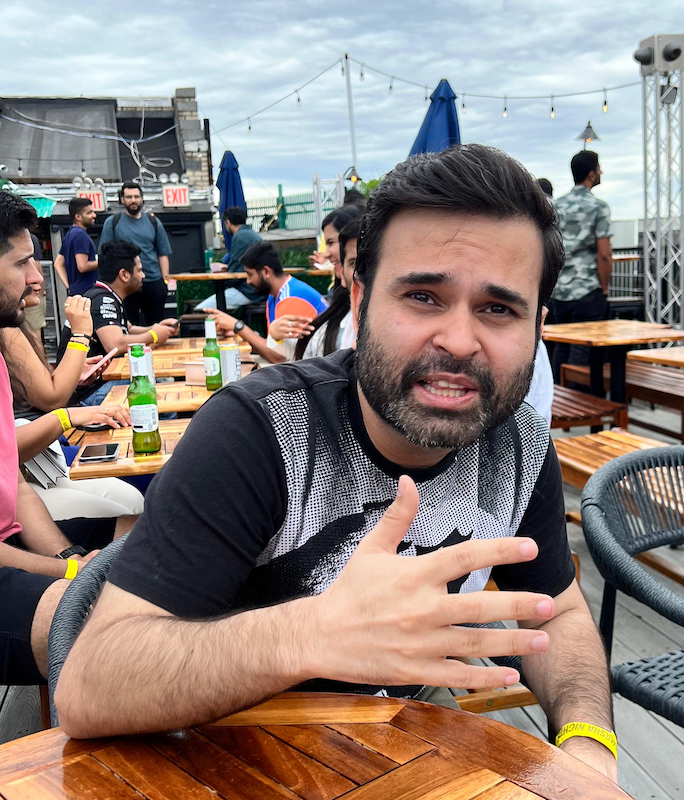As a product manager at a New York-based travel tech company, Navdeep Singh has managed engineering teams from India, Ukraine, and the U.S.
“Sometimes I couldn’t understand the accents of my Ukrainian team members,” he said. “I wished we could have video calls with English transcription, like in foreign movies.”
He shared his thoughts with a colleague, Alex Horlenko, who is based in Kyiv. The duo decided to create a smart video conferencing platform to help international teams communicate better.

Like many others, Navdeep got laid off during COVID-19.
It was the unwelcome ‘birthday surprise’ that he chose to see as an encouraging sign.
“I thought to myself — it’s a good time to take a leap of faith and launch my own business,” Navdeep said.
He was inspired by the success of Flipkart, India’s first big unicorn, where he had started his career.
Then Alex joined his venture as a co-founder. “He’s a perfect partner for me because he’s very calm,” Navdeep said. “I am the excited one, and Alex is logical, so I contact him first when I’m about to fire somebody.”
Building the platform wasn’t easy, so Navdeep sought another co-founder with video-conferencing experience. This is how Mayank Patidar, a young software engineer and recent graduate of the Indian Institute of Technology, Guwahati, came on board.
Keep calm and carry on pivoting
During COVID-19, Zoom conquered the world, and Microsoft Teams gained popularity. The Indian-Ukrainian team realized it would be hard to beat the giants, so they turned their product into “Grammarly for communication”, where users receive feedback on verbal skills.
This idea didn’t fly either. “Poor communication isn’t going to improve your career but it’s not gonna kill you either,” Navdeep said. Most people used the platform before an interview or a presentation, and then stopped right after, leading to low retention rates.
Navdeep’s own immigration hurdles completely shifted the startup’s direction.
He wasn’t selected for the H1B lottery and had to take the IELTS language test to change his immigration status. “During that time, I noticed that people preparing for language exams used our platform a lot,” he said.
Before that, Navdeep had to take the GMAT five times to get into Cornell. He realized international students are a huge market.
“We found out that universities pay 10-15% of tuition fees as commission for an international student,” Navdeep said. In 2023, The biggest player in student placement, Australia-based IDP Education, reported a record revenue of AUS $982 million (more than USD $664).
Two years after launching their first venture, the Indian-Ukrainian team pivoted from verbal communication to a marketplace for foreign students.
The immigrant nation
Currently, Kandor helps students preparing for the IELTS exam with reading, speaking, writing, and listening skills. There is also an AI chatbot for exam prep.
The team chose IELTS as the most popular English language test, with around 3,5 million takers annually. In the future, Kandor plans to expand to TOEFL (around 2 million people), PTE (350,000), and Duolingo (300,000).
Some of Kandor’s major competitors include Kaplan, IDP, ApplyBoard, LeverageEdu, Leap Scholar, and others.
The startup first focused on Indians as the biggest immigrant population in the world. Recently, users from Pakistan, Nepal, and Nigeria have also started using the platform. The Kandor exam prep app now has 150K downloads on iOs and Android.
Kandor plans to roll out more features to help students select a specific country and university, apply for loans or visas, and more. The team is building an AI counselor to analyze job data in different countries.
“It will be like: “Hey, if you want to be a healthcare worker, you should go to Canada, where there’s a big demand,” Navdeep said. “With a background in math and computing I am good at connecting the dots and using the data correctly.”
The startup also partners with traditional study abroad consultancies, such as AECC, and Shorelight, who already have ties with hundreds of U.S. universities.
“Harvard isn’t gonna pay you”
With monthly revenue of around $10K, Kandor is raising its first round, but they also have to explain the market’s potential to investors.
“Most folks in the venture industry have an Ivy League background and aren’t aware of a huge number of mid-tier schools offering commission for placements,” Navdeep said.
“One investor said: ‘Harvard isn’t gonna pay you.’ But 60-70% of international students go to 5% of universities, because folks in India, Africa, and Pakistan have never heard of CUNY or Cornell.”
Today, these universities recruit graduates using human agents. Kandor collaborated with the counselors, sharing students IELTS scores and preferable study destinations.
“Only 60 students out of 10,000 users found placements through agents.” Navdeep said. “The conversion rate is so low that I feel like we need a good AI product in this market.”
Coding across war, time zones and cultural differences
“The war in Ukraine affected us badly,” Navdeep said. “But Ukrainians are strong people so I’m blessed to work with them.”
He believes that although the war had an impact on Ukrainian coders’ performance, they are still the best in the world.
“Our front-end developer, Oksana Dushenko, delivered a code on the day of her marriage,” he added. “Can you imagine that?”
When Oksana got pregnant and went on maternity leave, Kandor found a temp developer. “That person was drafted in the army within one month of us hiring him,” Navdeep said.
The team is dealing with the situation by being efficient. “Also, for my co-founder and developers, our startup is a distraction from the horrors of war.”
Cultural differences and three time zones — the U.S., India, and Ukraine — posed another challenge for the team. Communication was key to overcoming these obstacles.
“I tell my team the whole story and communicate every single action, whether I’m firing, or raising capital,” Navdeep said. “And I make sure everybody makes their point. With Ukrainians, because of cultural differences, I sometimes have to force them to speak up.”
According to Navdeep, U.S. investors aren’t too concerned about the geopolitical situation affecting the team. “I think we’ve already proven we have the technical strength to deliver a great product,” he said.
The bigger risk lies in the U.S. immigration system. “For example, if tomorrow the government introduces a ban, this would affect us,” Navdeep said. “The international student market is highly influenced by immigration policies.”








